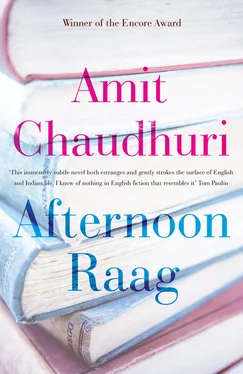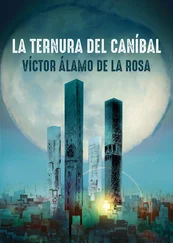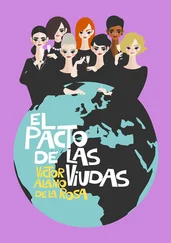Amit Chaudhuri - Afternoon Raag
Здесь есть возможность читать онлайн «Amit Chaudhuri - Afternoon Raag» весь текст электронной книги совершенно бесплатно (целиком полную версию без сокращений). В некоторых случаях можно слушать аудио, скачать через торрент в формате fb2 и присутствует краткое содержание. Год выпуска: 2015, Издательство: Oneworld Publications, Жанр: Современная проза, на английском языке. Описание произведения, (предисловие) а так же отзывы посетителей доступны на портале библиотеки ЛибКат.
- Название:Afternoon Raag
- Автор:
- Издательство:Oneworld Publications
- Жанр:
- Год:2015
- ISBN:нет данных
- Рейтинг книги:3 / 5. Голосов: 1
-
Избранное:Добавить в избранное
- Отзывы:
-
Ваша оценка:
- 60
- 1
- 2
- 3
- 4
- 5
Afternoon Raag: краткое содержание, описание и аннотация
Предлагаем к чтению аннотацию, описание, краткое содержание или предисловие (зависит от того, что написал сам автор книги «Afternoon Raag»). Если вы не нашли необходимую информацию о книге — напишите в комментариях, мы постараемся отыскать её.
Afternoon Raag — читать онлайн бесплатно полную книгу (весь текст) целиком
Ниже представлен текст книги, разбитый по страницам. Система сохранения места последней прочитанной страницы, позволяет с удобством читать онлайн бесплатно книгу «Afternoon Raag», без необходимости каждый раз заново искать на чём Вы остановились. Поставьте закладку, и сможете в любой момент перейти на страницу, на которой закончили чтение.
Интервал:
Закладка:
Morning passes. When my father used to work in the city, and we lived in a flat in Malabar Hill overlooking the Arabian Sea, my mother would sometimes go to the Bombay Gymkhana in the afternoon and settle upon one of its spacious, boat-like wicker sofas, sinking into its oceanic cushions and dozing off till my father arrived for tea. Coming back from school, which was nearby, I would see her there as a silent composition of loved details; the deliberate, floral creases of her sari, the pale orange-brown glow of her skin, the mild ember-darkening of her lipsticked mouth, the patient, round fruition of her bun of hair, and the irrelevant red dot on her forehead. Seeing her was like roaming alone in a familiar garden. In cool, strategic corners, waiters stood in coloured waistcoats with numbered badges pinned to them; never did a name seem more apposite than then, in the afternoon, before people started coming in, when these waiters impassionedly waited, dark Goan men in neat clothes, inhaling and exhaling and lightly chattering among themselves. The most invigorating fact about the club was its long corridor, an avenue of light reflected off a polished floor and protected by arches. It was frequented mainly by company executives: general managers and directors. Dressed alike in tie and white pinstriped shirt and dark suit, they looked to me like angels. In the club, these managers would sit on chairs and childishly ring little brass bells to summon the waiters. With the waiters they shared a marital relationship of trust and suspicion, and an order wrongly taken could precipitate a storm and a crisis, a sudden display of emotions, shouts and insults. Food was in abundance, from the American hamburger to chop-suey to the local bhelpuri with its subversive smells of the narrow, spice-selling streets of west Bombay. My mother was always much amused by the sight of people eating around her, moving their mouths in a slow, moral way; human beings are the only creatures, she says, who eat habitually without hunger. Longnosed Parsi lawyers stabbed their food, using knives and forks with jurisprudential elegance. Gujarati businessmen, educated in the school of life, employed fingers, holding the crispy wafer of the bhelpuri and biting it competitively, as if they were afraid it might bite them first.
Though we live now in the suburbs, habit still drives us to the city, from where my parents return at evening. My father falls asleep in the backseat of the Ambassador, this car which is now ours after his retirement, and my mother too dozes upon his shoulder. In a place near the rear-window are laid out the day’s shopping, curved, inanimate objects my mother loves, such as spatulas and spoons, and little oases of food. The Ambassador is a spacious, box-like vehicle with a Taurean single-mindedness and a rickshaw’s tenacity. It is known as a ‘family car’; on Sundays, cousins and aunts on outings will sit, perspiring, inside it; I myself associate its hot floorboards, its aching gear-pulley, its recalcitrant pedals, with domesticity and the social events of childhood. Of all cars I know, it has perhaps the most uplifting name, as if its appointed office were to, wide-eyed, bring good news to the world. Meanwhile, our Ambassador joins the long, mournful crocodile of cars from Churchgate to Linking Road, and we know we are near home when we come to the Mahim Creek, where fishermen’s boats are parked upon the sand; here, even if your eyes should be closed, or if you should be entering the city from the direction of the airport, you will be woken by the smell of dried or rotting fish, a strong but pure odour blown inland, bitter and sharply intimate as the scent of a woman’s sex.
When it is evening in the lane, my parents go down and walk for half an hour. Their lonely parade, their quiet ambitiousness as they walk up and down the compound, sometimes conferring, is witnessed by a watchman in khaki, sitting on a steel chair beneath blue light. This is an exercise they have rediscovered from when my father was a student in London, and my mother his newly-married wife, introverted, with a red dot on her forehead and vermilion in the parting of her hair, awkward but warm in her huge green overcoat. Then, too, they would walk together the wet roads from Belsize Park to Swiss Cottage. Afterwards, they go upstairs, and my mother sits on the bed, reading the Afternoon Despatch and Courier. She turns first to the last page, where Busybee’s ‘Round and About’ is printed. Thus she continues this daily column about Bombay, its Irani restaurants, its post-offices, its buses, its cuisine, and this man’s fictional wife and his dog. Years ago, my mother and I fell in love with Busybee’s voice, its calm, even tone, and a smile which was always audible in the language. My father, meanwhile, is clipping his nails fastidiously, letting them fall on to an old, spread-out copy of the Times of India, till he sneezes explosively, as he customarily does, sending the crescentshaped nail clippings flying into the universe.
5
The first few weeks I knew Shehnaz, when we were still getting to be friends, was an uncomplicated time. We made appointments and did not keep them; we made appointments to discuss when we might meet; we liked each other but were occupied, like children, with other things to do. Sometimes I am nostalgic for that make-believe busyness, full of innocence, of having ‘other things to do’, the prelapsarian background of lectures, bookshops, friends, our lives spent generously and routinely like rain-showers, stopping and starting again.
We decided to meet at the St Giles’ Cafe near the Oxfam Bookshop. ‘Do you know where it is?’ she asked me with a smile; these sociable questions she would invest with a mischievousness, so that they became funny and meaningful, and I would always pretend to be embarrassed answering them. I did know the St Giles’ Cafe; it was the only place in Oxford that served a strong and dark coffee, with a scorched South Indian flavour; a white froth, almost a scum, formed on the top even before they had put the milk in it. Unlike the coffee in the Middle and Senior Common Rooms, it was hot, and one could, with a certain satisfaction, admire the steam rising from the cup before one drank from it. The cafe was a small, ugly and crowded place, full of students, and tramps minding their own business, hatted and bearded, with an unworldly look about them, like musicians. On either side of each table, there was a bench, and one had to squeeze past people to sit down, or have people squeeze past you as they got out. Thus, as one made small adjustments in position, one was always feeling grateful or obliged, strangely powerful or powerless; one shrank and hunched, and then graciously expanded again, in regular accordionlike time. Each table also had an introvert who sat in the corner throughout and looked at no one. When people were called to take their food from the counter, they were not addressed by their names, but by their orders—‘Ham and eggs!’ ‘Plate of chips!’ ‘Bacon sandwich!’—and, calmly and without confusion, those who had been labelled so uniquely rose and walked towards the counter. Whenever the door opened, a draught entered from outside, but the baked air inside, smelling of frying bacon, cushioned us from the cold and from other influences. The paradoxical confluence of timelessness and movement in the cafe made it an ideal place for a first meeting between two foreign students.
Yet that meeting, comically, was not to be. It was the beginning of summer, and some girls walked barefoot that day on Cornmarket Street. There was a hustle and bustle, a festive hurry, and even Ryman’s, the stationery shop, had inspired-looking customers queueing up to pay for envelopes and sheets of paper and Sellotape. Sharma and I were roaming around at our ease in loose shirts, two Indians who might never have met in India, feeling at home, giving studious attention, as if it truly mattered, to shop-windows and an ancient organ-grinder, edging our way towards Westgate, both of us feeling boyish, and I especially younger because I was wearing sandals. It began to thunder then, and rain very hard, as it does at home; girls screamed in English, and people who were waiting for the bus panicked, but soon the crowds deployed themselves into neat and dripping little squadrons, cheerful and brave, and the entrance of the Clarendon Centre and the great department stores were converted into shelters with an unfussy swiftness. I had never seen it rain like this in England before; water collected in the lanes and flowed past us as it does in Calcutta; and the English were excited at first and then reasonable and collected, telling each other jokes and enjoying themselves; it was all a little like but yet very unlike the wise dailiness with which an Indian outwaits a shower. Sharma looked at the sky and felt poetic and told me how he was reminded of his village. Thus I did not meet Shehnaz that afternoon but waited outside a shop that sold shoes and saw wet and laughing people running and disappearing, and committed to memory the rare, leisurely couple who walked by, contented and soaked. Later, Shehnaz told me how she had cycled to the St Giles’ Cafe after it had stopped raining, but had found it empty except for its owners, the stentorian callers of ‘Ham and cheese’ and ‘Bacon sandwich’, who were silent now, and busy mopping up the wet floors.
Читать дальшеИнтервал:
Закладка:
Похожие книги на «Afternoon Raag»
Представляем Вашему вниманию похожие книги на «Afternoon Raag» списком для выбора. Мы отобрали схожую по названию и смыслу литературу в надежде предоставить читателям больше вариантов отыскать новые, интересные, ещё непрочитанные произведения.
Обсуждение, отзывы о книге «Afternoon Raag» и просто собственные мнения читателей. Оставьте ваши комментарии, напишите, что Вы думаете о произведении, его смысле или главных героях. Укажите что конкретно понравилось, а что нет, и почему Вы так считаете.












